Gator Growl turns 100. Here's a look at the past 10 decades
The upcoming University of Florida Homecoming celebrates 100 years of Gator Growl, a student-led pep rally designed to promote school spirit before kickoff. To commemorate ten decades of Gator Growl, take a look at these ten fun facts.
History:
UF’s first Homecoming football game was in 1916, replacing the “Dad’s Day” game, which invited students’ fathers to come visit the campus. Student leadership honor society Florida Blue Key added the student-run Gator Growl to the festivities in 1923. The first event was held on Florida Field on the Friday night before the game, and the show included comedic skits and musical performances from campus organizations. Ending with a bonfire, freshmen were challenged to bring their weight in fuel and firewood. The bonfire portion of the rally was removed in the early 1950s.
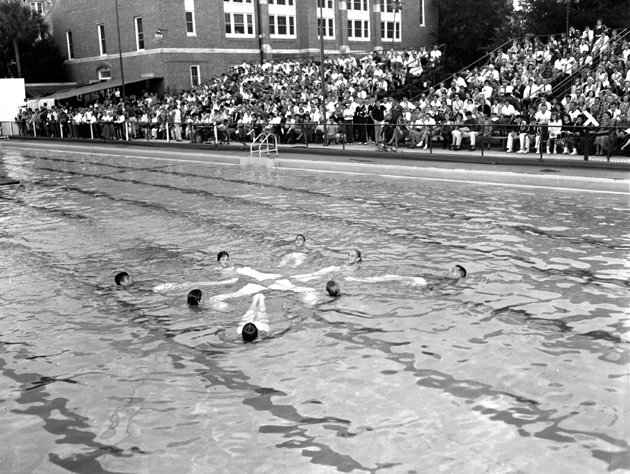
(Courtesy of the UF Archives)
The lost tradition:
From 1948-1965, Homecoming week featured an aquatic ballet composed of synchronized swimming and diving. Titled the Swimcapades, this team combined over 100 coed swimmers for performances and gained enough traction to reach thousands of audience members. The show reached peak popularity in 1958 and was asked to perform three times that year.
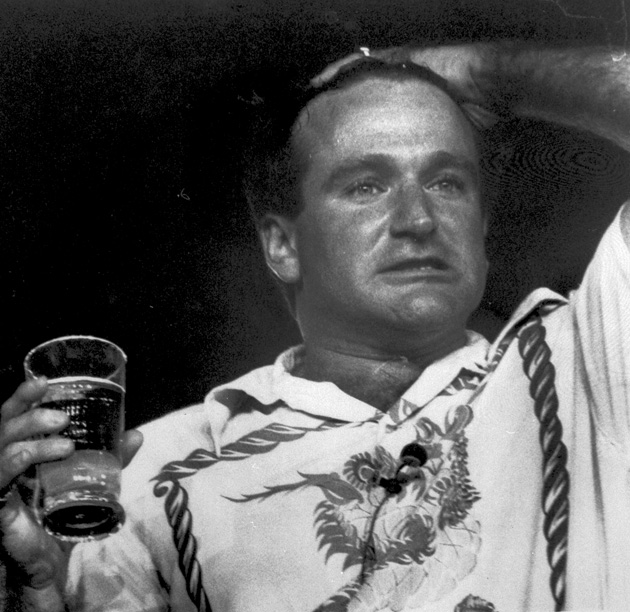
(Courtesy of the UF Archives)
Hosts with the most:
Many musicians, comedians, and famous faces have graced the Gator Growl stage. Jerry Seinfeld served as the opening act in 1988, approximately one year before his popular sitcom show “Seinfeld” aired on NBC. Other notable comedians include Howie Mandel, Robin Williams, and Billy Crystal. Alternative rock band and Gainesville native, Sister Hazel, debuted its number-one single “All for You” at Gator Growl in 1997. By 2013, the show transitioned from primarily stand-up routines to musical performances. Pop singer Jason Derulo is set to perform this year, following previous headliners Flo Rida and Gunna. Prior to this, Gator Growl featured a wide section of music ranging from Josh Turner, Lynyrd Skynyrd, Echosmith, The Smothers Brothers, and Neon Trees.
Admission:
For nearly half a century, admission to Gator Growl was free. UF’s Student Government charged ticket prices for the production starting in 1972. The tickets started at 50 cents each, covering the cost of the show’s elaborate fireworks display and professional entertainers. Present-day tickets range from $55-$90.
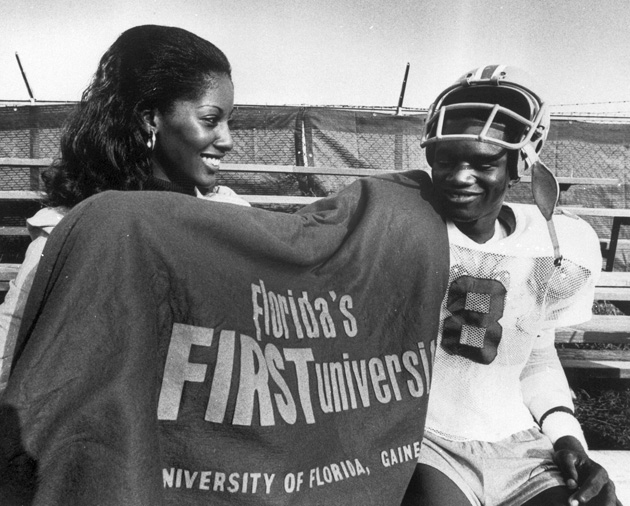
(Courtesy of the UF Archives)
Homecoming Queen:
Since 1953, Gator Growl also served as the annual coronation of a new Homecoming Queen. Maria Junquera-Brown served as the first Hispanic homecoming queen in 1970, and three years later, Cynthia Mays became the first Black homecoming queen. These women weren't the only queens on campus due to the short-lived title of “Mrs. University of Florida.” After World War II, married veterans returned to campus on the GI Bill, and their wives competed in the new winter pageant from 1955-1970. Unlike the homecoming criteria, this pageant judged married women solely on their cooking ability, sewing rounds, poise, and beauty.
The one that got away:
In 1980, The Beach Boys were announced as the headliners for Gator Growl. The group canceled and was replaced by singer and actress Irene Cara. This incident created an outcry from students who wanted to have a say in picking the singers or comedians for the following years.
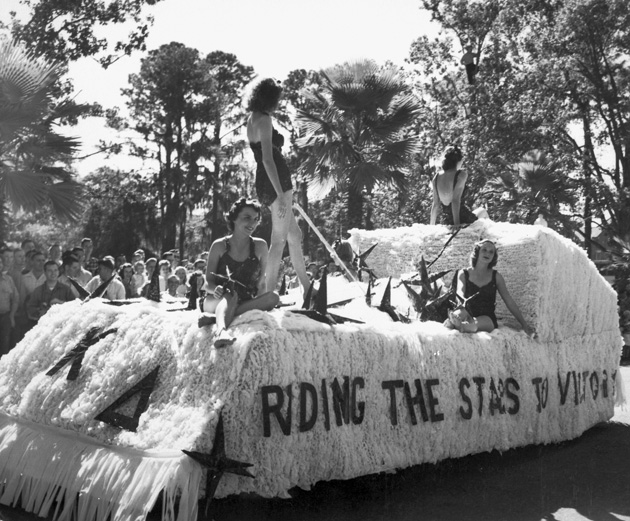
(Courtesy of the UF Archives)
Parade:
In 1916, the Fightin' Gator Marching Band led the first Homecoming parade. Starting in 1948, the parade planning committee hosted yearly themes and challenged student organizations to decorate extravagant floats. The parade eventually became recognized as the largest student-run parade in the nation, breaking records in 1996 as it broadcasted on WUFT-TV and drew an in-person crowd of 100,000 adults and children.
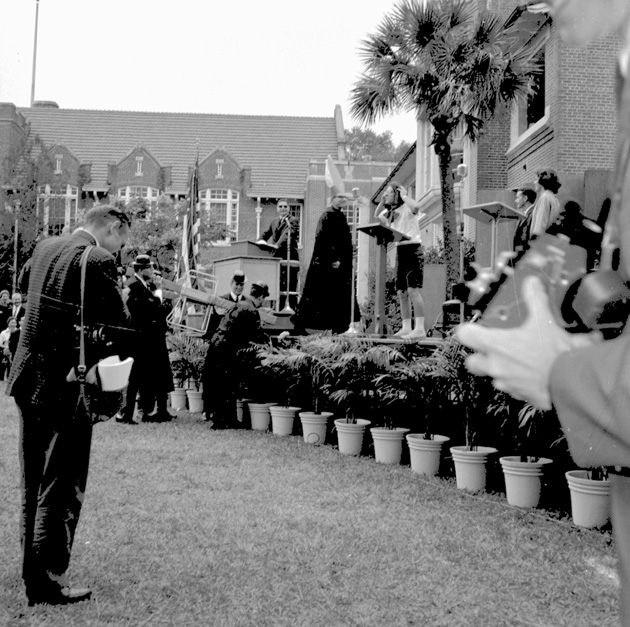
(Courtesy of the UF Archive)
Skits:
Every Homecoming, satirical skits used to be heavily advertised and performed outside the law school by the John Marshall Bar Association, an organization for UF law students. One of their most notable skits handed out 20 “Ronald Awards” named after Ronald McDonald hamburgers. The political and controversial skits were later removed, but the John Bar Marshall Association remains as one of the oldest UF organizations.
Homecoming game:
UF has won 71 out of 99 homecoming football games in the Swamp. This year the team will battle the Vanderbilt Commodores, only two years after beating them in a shutout of 42-0.
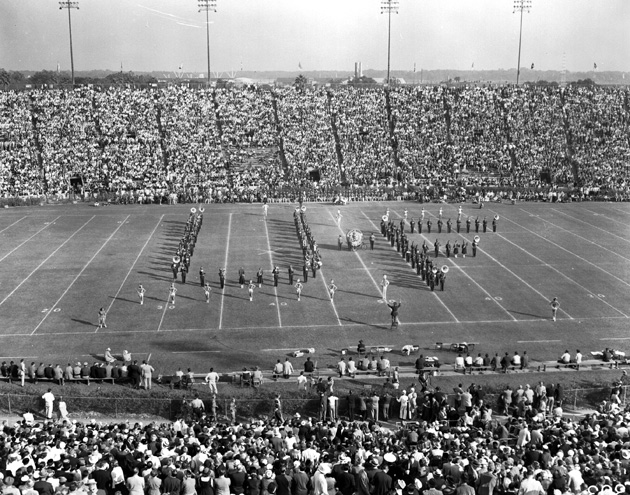
(Courtesy of the UF Archives)
Pride of the Sunshine:
This year’s homecoming also marks the 50th anniversary of the Fightin’ Gator Marching Band alumni halftime show, which invites all past band members to take the field once more. More than 300 alumni have registered to participate for the anniversary. The band serves a longstanding tradition for its continued participation in Gator Growl, parade, pep rally, and game day performances.
